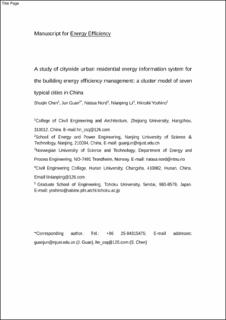A study of citywide urban residential energy information system for the building energy efficiency management: a cluster model of seven typical cities in China
Peer reviewed, Journal article
Accepted version

Åpne
Permanent lenke
https://hdl.handle.net/11250/2649564Utgivelsesdato
2019Metadata
Vis full innførselSamlinger
Sammendrag
he lack of empirical data demonstrating the relationship between influencing factors and building energy performance is one of the primary barriers in energy efficiency management. A citywide residential energy information database and the data-based analytical methodology help increase the knowledge about the local real estate situation, explore energy efficiency opportunities and measures, financial investment, and market trend in the local building stocks, and make the reasonable policies as well. Few databases were established in USA and Europe only covering the building information and energy use, while there are lack of an indices system and database of building energy efficiency information in China. Therefore, in this study, a definition of urban residential energy information system is suggested, covering the parameters of building characteristics, household characteristics, possession and operation of domestic appliances, indoor thermal environment, climate condition, energy market, economic level, municipal infrastructure, and energy use consequence. Consequently, a database is developed to collect the raw data in seven typical cities in China. A classification model is established by Quantitative Theory III to classify and characterize the urban residential energy use systems into three different city groups, and suggestions are made to guide the energy efficiency work for different city groups. The case study is a good example to demonstrate the methodology and the analysis provided a helpful reference for the citywide building energy efficiency management. A study of citywide urban residential energy information system for the building energy efficiency management: a cluster model of seven typical cities in China